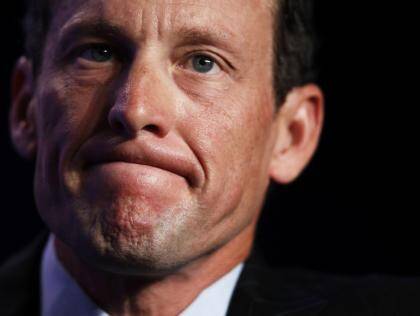I have some very complicated feelings about Lance Armstrong's upcoming confession and, I presume, apology on Oprah Winfrey's show.
As a Jesuit, a priest, a Catholic and a Christian, I believe that everyone deserves the opportunity for forgiveness. Our faith is founded on a forgiving love. It’s surely the hardest part of being a Christian, but perhaps the most essential. Jesus himself forgave his executioners from the Cross. Later, after the Resurrection, Jesus forgave Peter, after Peter denied him three times before the Crucifixion. And Jesus asked his followers to forgive one another “seventy times seven” times. Finally, one of his most famous parables is the Prodigal Son, who is forgiven by his father even before asking for pardon.
So it’s pretty clear what the Christian is supposed to do: hard as it may seem, forgive.
Lance Armstrong warrants forgiveness as much as any sinner does—myself included. And I salute him for finally coming clean about his moral failings and his crimes, if that is what he indeed does on Ms. Winfrey’s upcoming show.
On the other hand, the extremely well-documented stories about his actions, which apparently included suborning other teammates into doping, were shocking. I’m well beyond the age where I expect my heroes to be squeaky clean (and after the sex abuse crisis in the Catholic Church I’m even more jaded about such things). But the malign and continuing pressure that Mr. Armstrong exerted on his teammates still seemed shocking. He has done damage to the sport, as well as to sport in general.
On the third hand, his upcoming announcement that he will testify against officials who turned a blind eye to doping seems too quick, almost opportunistic, for my taste. At least he is cooperating with law enforcement officials at this point, but it seems (and this is an entirely subjective) an odd thing to announce as soon as you have confessed. It’s as if you’re still in the confessional and start telling the priest about other people’s sins.
Like I said, I have very complicated feelings.
One useful way of understanding all of this may be the Catholic Church’s Rite of Reconciliation, i.e., aka the Sacrament of Confession. Traditionally, three things are required for a good confession.
First, you need to confess your sins fully. The temptation here (and I’m speaking both as a confessor and a confesee) is to tell only what is expedient, convenient or less painful. Imagine Peter saying, “That third time I denied you, Jesus? Well, I didn't mean that one as much.” Second, you must have true contrition. That means you’re actually sorry for having done what you did. Notice that’s doesn’t mean, “If anyone is offended, I’m sorry,” but rather, “I’m sorry.” Finally, you must demonstrate (and have) a “firm purpose of amendment.” That means a real desire not to sin in that way again. Only then does the person receive absolution from the priest, who speaks on behalf of the church and in God’s name.
Absolution, though, also is predicated on something else: penance. This is something that is often overlooked in modern culture—even in the church, where while some church leaders in the abuse crisis confessed their failings, they never seemed to perform any public penance. (And I don’t count penances undertaken by an entire diocese, which seem not only vague but asking for “penance” from the wrong people.)
The Rite of Reconciliation is meant not only to communicate God’s forgiveness, but also, as the name suggests, reconcile the person to God and the community. To that end, an act of penance usually helps the person take concrete steps towards reconciliation—it’s a physical or spiritual gesture that helps to make amends. Penance isn’t something done for its own sake, but from a desire to return the person, and the community, to wholeness. After all, the sacrament is not about how bad the person is, but about how good God is.
Often (but not always) that act of penance includes something that another person, or other people, can see. That is, it’s often done for someone, or some group. For example, returning a stolen object and apologizing to the owner. Doing an act of charity for a person you’ve harmed. Doing some form of public service for a group you've wronged. For reconciliation with God demands reconciliation with the community.
So maybe if Mr. Armstrong confesses his sins, is truly contrite, and has a firm purpose of amendment, and then does penance, forgiveness will come his way.
But that doesn't mean he should be considered a moral leader, much less a role model. Nor does it mean that he needs to be welcomed back as a noble or even admirable sports hero, as if nothing had happened. To take an easier model, you might forgive a person for stealing money from your company, but you’re not going to make him the treasurer.
On the other hand (how many hands is that now?) Jesus did just that for Peter: he takes the man who denies him and makes him head of his church. Part of this was meant, I would suspect, to serve as a visible sign for the community, demonstrating how deeply he forgave the man; and part of it was, I would suspect, a manifestation of Jesus’s desire to choose someone who understood his own weakness.
Where does that leave us with Lance Armstrong? No one knows what is going on in his soul--not even Oprah. I’m inclined to say that, as a Christian, we should forgive. But forget? All I can say that if a young person asks me for an example of how to “live strong,” I’ll look elsewhere.








